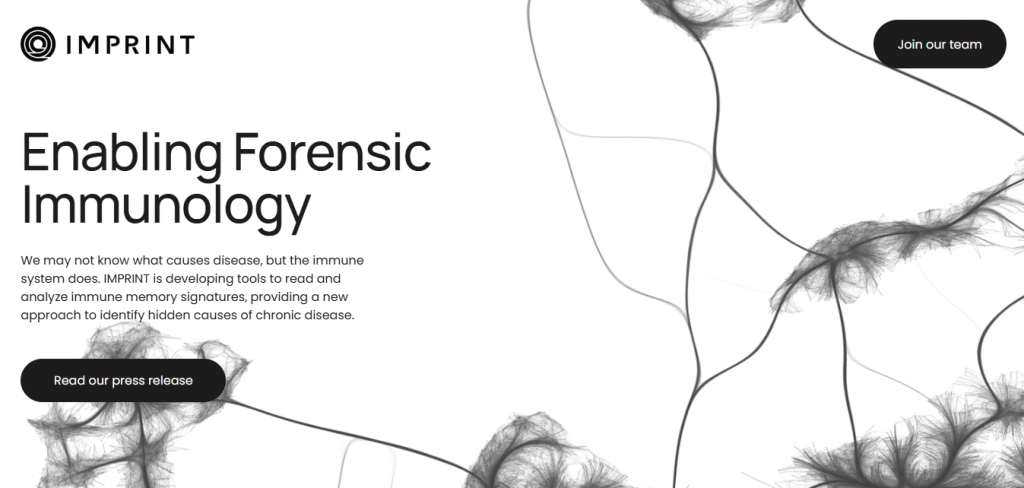IMPRINT Raises $15M to Revolutionize Forensic Immunology and Chronic Disease Detection
July 14, 2025
byFenoms Startup Research

IMPRINT, a trailblazing startup in immunology diagnostics, has secured $15 million in funding to fuel its pioneering work in forensic immunology - a new approach to identifying the hidden immune signatures behind chronic diseases. The round saw participation from notable backers including Eric and Wendy Schmidt, Convergent Research, Peter Reinhart, and the New York City Economic Development Corporation (NYCEDC).
Led by Beck Brachman, IMPRINT is building tools that decode the language of the immune system, opening up previously invisible pathways in disease detection, treatment, and prevention.
Redefining Diagnostics with Forensic Immunology
Forensic immunology - IMPRINT’s core innovation - centers around identifying immune memory signatures that remain long after an illness or autoimmune disruption. These signatures are often imperceptible to traditional diagnostics, yet they hold the key to unlocking conditions like Long COVID, fibromyalgia, chronic fatigue syndrome, and neuroimmune disorders.
Using a combination of advanced sequencing, machine learning, and systems biology, IMPRINT analyzes immune traces much like digital forensics examines hidden files - uncovering the immunological "footprints" of disease.
Timing, Not Just Technology
What makes IMPRINT’s approach so potent isn’t just the science - it’s the timing. Chronic diseases cost the U.S. over $4.1 trillion annually, according to the CDC, and autoimmune disorders affect 1 in 10 people worldwide. Yet the infrastructure for detecting root causes remains grossly outdated.
The market is starving for solutions that go beyond symptomatic diagnosis. IMPRINT steps into this gap by offering root-cause-level diagnostics, shifting healthcare from reactive to predictive.
Here’s where many founders in biotech and diagnostics miss the mark: they often treat validation and adoption as sequential - build the product first, then seek institutional partners. But in healthcare, long-term success hinges on doing both in tandem. IMPRINT understood that early. They didn’t just build tech for clinicians; they co-developed with academic researchers, embedding their tools in real-world studies from day one. That embedded research strategy doesn’t just de-risk the tech - it builds trust, speeds up adoption, and creates immediate scientific relevance.
When you solve for credibility first, go-to-market becomes frictionless.
Backed by Visionaries
With support from Eric Schmidt, former CEO of Google and longtime champion of frontier science, IMPRINT joins a growing league of science-first companies pushing the boundaries of what’s possible in human health. The company is also aligned with NYCEDC’s broader initiative to turn New York into a global life sciences hub, driving innovation, job creation, and public health impact.
The Hidden Edge Most Startups Miss
One insight sets IMPRINT apart - and it’s a lesson many founders overlook: platforms built for discovery create their own markets. Most healthtech startups build products to serve existing demand (i.e., faster diagnostics, better EHR systems). IMPRINT, on the other hand, is building tools that create new categories of diagnostic capability. This approach doesn’t just lead to product-market fit - it creates research-market fit, giving the company an unmatched edge with research institutions, pharma, and public health partners.
When startups take on the harder technical problems that unlock foundational insights - especially in healthcare - they not only build defensible IP but also future-proof their relevance as the science evolves.
A Booming Market for Immune-Based Diagnostics
The global immunodiagnostics market is expected to reach $32.1 billion by 2030, growing at a CAGR of 7.4%. Factors driving this growth include rising autoimmune cases, increasing government support for early disease detection, and the long-term health consequences of post-viral conditions like Long COVID, which affects an estimated 65 million people worldwide.
There is also a broader industry trend toward multi-omic diagnostics - integrating genomics, proteomics, and immunomics - which is accelerating the demand for immune-focused healthtech startups. Venture funding in precision diagnostics topped $5.2 billion in 2023 alone, according to CB Insights.
As governments and payers seek to cut long-term costs through early detection and personalized medicine, companies like IMPRINT are poised to define the next decade of innovation in preventive healthcare.
What’s Next for IMPRINT?
With fresh capital, IMPRINT plans to expand its research team, accelerate its clinical validation partnerships, and bring its first commercial offerings to healthcare institutions and biotech partners. The startup will also invest in expanding its immune signature atlas - a cornerstone of its machine learning infrastructure.
By continuing to build relationships with leading academic centers and government health agencies, IMPRINT is not just introducing a new product - it’s laying the groundwork for a new standard in chronic disease detection.









